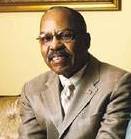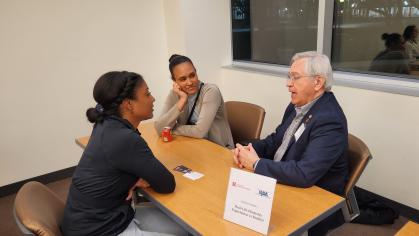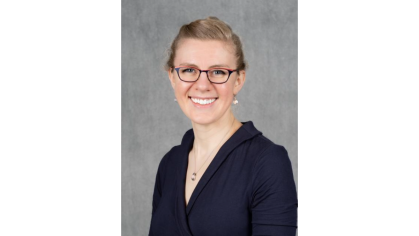RSDM Alum Remembers Milestone Civil Rights Lunch Counter Protest
 North Carolina college students during the historic Woolworth's protest of 1960.
North Carolina college students during the historic Woolworth's protest of 1960.
The four students who refused to leave the lunch counter of a segregated North Carolina Woolworth's are remembered today as heroes of the Civil Rights movement.
But people like RSDM alum Dr. George McLaughlin -- who joined his classmates during the early days of their sit-in -- also shaped history. He was among a small but growing wave of students who turned out to support them, and kept showing up, eventually sparking a nationwide flood of student protests at lunch counters across the U.S.
Many, like McLaughlin, endured threats and harassment by angry whites, who tossed lit cigarettes at them or threw food and drinks.
“We just kept sitting there. We would line up behind the stools and when one student would get up, another would sit down,’’ remembers McLaughlin, an associate clinical professor in the Department of Restorative Dentistry at RSDM.
In 1960, McLaughlin was studying to become a mechanical engineer at North Carolina Agricultural and Technical State University in Greensboro. The four initial protestors were fellow students, and although he didn’t know them very well, he felt an immediate sense of solidarity.
Like them, he grew up in the Jim Crow south. His hometown of Raeford, North Carolina had separate but unequal schools for black students and one for Native American children, who were subject to the laws of segregation as black residents.
As a child, McLaughlin remembers white students shouting racial slurs out the bus window as black students waited for their own bus to school. Sometimes, there was violence. It wasn’t uncommon for white drivers to intentionally run black pedestrians off the road, he said.
“We hoped that things would change through education. That’s the reason we all tried to go to school. That’s what our parents always told us. Get an education, because that’s something no one can take a way from you,’’ said McLaughlin, whose parents were farmers.
North Carolina Agricultural & Technical State University was a historically black college, where students often shopped at the Woolworth’s in downtown Greensboro.
“We would go buy school supplies and something to eat, but we couldn’t sit down and eat it,’’ he said.
The Civil Rights movement was already underway in the wake of the Montgomery Bus Boycott in 1955 and the lynching of 14-year-old Emmet Till. But the four freshmen students who first refused to leave the lunch counter weren’t initially part of any organized movement, McLaughlin remembers.
“They decided they would sit down until they were served,’’ he said.
When Woolworth’s changed its policy in July of 1960, five months after the Greensboro sit-in began, students at North Carolina A&T, declared victory.
“We made a difference,’’ McLaughlin said.
After graduation, he went on to take engineering jobs with the U.S. Department of Defense and Westinghouse before pursuing his dental degree and graduating from RSDM in 1975. He is among the school’s first ten black graduates.
McLaughlin opened a dental practice in New Brunswick, where he still works, and began teaching part-time at RSDM in 1988. “I try to impress upon my students that you have to have good people skills to be successful, not only with patients but with your staff, too,’’ he says.
During his dental career, McLaughlin has held many honors. He has served as past president of the New Jersey Academy of General Dentistry and is a fellow of both the International College of Dentists and the American College of Dentists.
But his interest in activism didn’t stop in North Carolina. In New Jersey, he fought discriminatory housing practices, joining protests in Essex County in the 1960s and 1970s.
He never forgot the lesson he learned at the lunch counter of Woolworth’s. “I think it shows that it doesn’t take a lot of individuals to start a movement.’’




